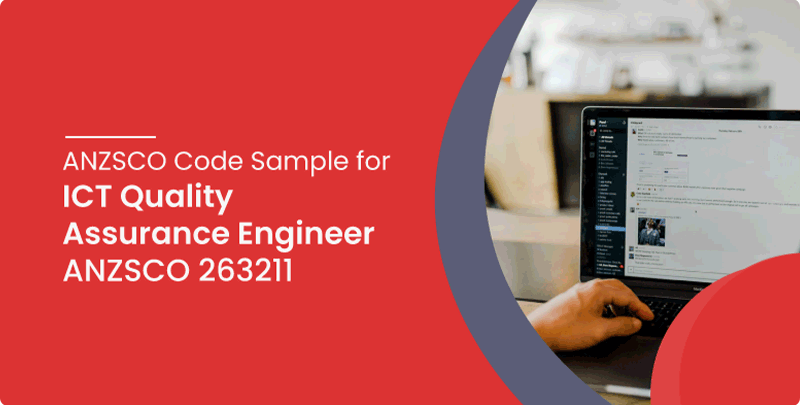Get Free Consultation
ANZSCO Code
ANZSCO 263211 ICT Quality Assurance Engineer
ICT Quality Assurance Engineer creates, maintains and manages technical quality assurance processes and procedures to assess efficiency, validity, value and functional performance of computer systems and environments, and audits systems to ensure compliance with, and adherence to, accredited internal and external industry quality standards and regulations. ICT Quality Assurance Engineer may supervise the work of ICT quality assurance teams.
Skill Level
Level 1 or Equivalent
Specializations
Computer Systems Auditor
Systems Auditor (ICT)
Skills Assessment Authority
ACS (Australian Computer Society)
Alternative Titles
Quality Manager (ICT)

On the Occupation Lists:
- Combined Skilled Occupations List (STSOL MLTSSL)
- Short-Term Skilled Occupation List (STSOL)
- RSMS Occupations List (RSMSL)
Not on the Occupation Lists:
- Labour Market Testing Required for 457 List (LMTL)
- Medium Long Term Strategic Skills List (MLTSSL)
Visa Provision
As the occupation features on the Short-term Skilled Occupation List (STSOL), it is possible to apply for a Skilled Nominated 190 visa or a Skilled Regional Nominated 489 visa.
If you are employed in this occupation and you wish to pursue a GSM visa, you will be required to apply for state nomination in order to move to Australia.
Note: *Please note that while the occupation is on the STSOL it remains a possibility that no states currently have a demand for people in that profession. The online assessment only lists occupations which are currently in demand by a state or territory in Australia, so if the occupation does not appear on the online assessment you should consider seeking an employer sponsor in Australia.
Unit Group: 2632 ICT Support and Test Engineers
The job of ICT Quality Assurance Engineer is to develop procedures and strategies to support, create, maintain and manage technical quality assurance processes and guidelines and systems infrastructure, investigate, analyze and resolve system problems and performance issues, and test the behaviour, functionality and integrity of systems.
Skill Level
Most occupations in this unit group have a level of skill commensurate with a bachelor degree or higher qualification. At least five years of relevant experience and/or relevant vendor certification may substitute for the formal qualification. In some instances, relevant experience and/or on-the-job training may be required in addition to the formal qualification (ANZSCO Skill Level 1).
English Requirement
- IELTS result with a minimum score of 6 (L, R, W), 7 in speaking and 7 overall;
- OET result with a minimum grade B in all sections;
- TOEFL iBT with a minimum score (L:12 R:13 W:21 S:23 overall L93);
- PTE Academic with a min score of 50 (L, R, W), 65 in speaking and 65 overall
Exceptions
- Australian Graduate exceptions apply in some states/territories
- Priority Skilled Lists may apply a specific requirement in some states
- Countries exempt from submitting IELTS or OET include the UK; Canada; New Zealand; US; and Ireland Where mandatory licensing or registration is required you must demonstrate a level of English either sufficient to meet licensing / registration or a minimum IELTS, or equivalent, whichever is higher.
Occupations in this Group
- 263211 ICT Quality Assurance Engineer
- 263212 ICT Support Engineer
- 263213 ICT Systems Test Engineer
- 263299 ICT Support and Test Engineers (NEC)
Definition
ICT quality assurance managers develop and implement an ICT quality plan that adheres to internal and external standards and the organization’s culture. They ensure that management controls are properly applied to safeguard assets, data integrity, and operations. They focus on accomplishing quality goals, such as maintaining external certification in compliance with quality standards, and they collect statistics to predict quality outcomes. A bachelor’s or postgraduate degree in a related information technology area is normally required to work as an ICT Quality Assurance Engineer (such as computer science or software engineering).
Skill Requirement
Perform software testing
Using specialized software tools, conduct tests to guarantee that a software product will work flawlessly under the given client criteria. Use software testing techniques and tools to detect software flaws (bugs) and malfunctions.
Maintain a state of constant readiness for investigations.
Maintain continual compliance with standards and regulations, such as maintaining up-to-date certificates and monitoring operations to ensure the right processes are followed so that audits run smoothly and no bad elements are detected.
Comply with all legal requirements.
Ensure that you are well-informed on the legal regulations that govern a given activity and that you follow its rules, policies, and laws.
Provide documentation for software testing.
Describe software testing techniques to the technical team and analyze test results for users and clients to tell them about the status and efficiency of the product.
Conduct quality assurance audits
Examine a quality system on a regular, methodical, and recorded basis to verify conformance with a standard based on objective evidence such as process implementation, effectiveness in attaining quality goals, and reduction and elimination of quality issues.
Tasks to Perform
- Scheduling and conducting quality audit inspections, and analyzing and reviewing systems, data and documentation
- Identifying variations and potential high-risk areas in securing adherence to standards and procedures
- Recommending corrective action plans and improvements in the resolution of non-compliance with standards detected through monitoring and auditing of processes and procedures
- Communicating, educating and liaising with users and management to ensure awareness and adherence to standards, procedures and quality control issues and activities
- Assisting in troubleshooting, diagnosing, testing and resolving system problems and issues
- Developing, conducting and providing technical guidance and training in application software and operational procedures
- Analyzing, evaluating and diagnosing technical problems and issues such as installation, maintenance, repair, upgrade and configuration and troubleshooting of desktops, software, hardware, printers, Internet, email, databases, operating systems and security systems
- Testing, identifying and diagnosing functionality errors and faults in systems, and programming code within established testing protocols, guidelines and quality standards to ensure systems perform to specification
- Performing organizational systems architecture reviews and assessments, and recommending current and future hardware and software strategies and directions
- Creating and reviewing technical documentation such as procedural, instructional and operational guides and manuals, technical reports and specifications and maintenance inventory systems
Closely Related Core ICT Units
- Business Process Reengineering
- Computer Audit
- ICT Security
- Operating systems – (Unix, Linux, Xenix, Network OS)
- Quality management – (Quality Assurance, Software Quality)
- Risk Management
- Software Engineering
- Software validation – (Software Testing)
- Testing strategies and methods
Brief Description
Business process re-engineering a business process is a set of logically related tasks performed to achieve a defined business outcome. also it is practice of rethinking and redesigning the way work is done to better support an organization’s. Risk Management process of identifying, assessing and controlling threats to an organization’s capital and earnings. These threats, or risks, including financial uncertainty, legal liabilities, strategic management errors, Those threats or the problems are could stalk from a wide variety of sources, like strategic, management errors, including financial uncertainty, accidents and natural disasters. networking is a systematic and logical process that follows a risk based approach to determine whether the information systems of an entity, including its detailed information technology processes, controls and activities access for all user in a way to handle all problems.
Additional Closely Related Core ICT Units
- Computer forensics
- Computer Science
- Data communications – (WAN, LAN)
- Database design
- Database implementation
- Database Management Systems – (Relational Database, Object Oriented Database)
- Digital communication
- Information security – (Data security)
- Internet forensics
- Introduction to ICT – (Introduction to Computer Science, Computer Theory, Introduction to Business Computing, Computer Science I)
- Introduction to Information Systems
- Network architecture
- Programming – (C, C++, Objective C, Visual C, Basic, Visual Basic, Java, Assembler, Cobol, Pascal, PL/1, Fortran, PHP, Pearl, AS3, FoxPro, and similar)
- Software architecture


